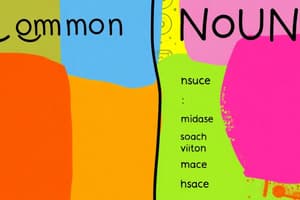Podcast
Questions and Answers
Common nouns can only function as subjects in a sentence.
Common nouns can only function as subjects in a sentence.
False (B)
Every common noun has a singular form but not a plural form.
Every common noun has a singular form but not a plural form.
False (B)
Many common nouns have etymological origins in Latin and Germanic languages.
Many common nouns have etymological origins in Latin and Germanic languages.
True (A)
Common nouns have remained unchanged over time due to their historical origins.
Common nouns have remained unchanged over time due to their historical origins.
By studying common nouns, we can gain insights into how language enhances social interaction and conveys meaning.
By studying common nouns, we can gain insights into how language enhances social interaction and conveys meaning.
Flashcards are hidden until you start studying
Study Notes
Common Nouns: A Universal Language of Objects and Ideas
Common nouns form the backbone of our daily communication, helping us describe objects, people, concepts, and abstract ideas with clarity and precision. These ordinary words allow us to identify and categorize entities in the world around us. Let's dive deeper into what common nouns are and their significance within human language.
Definition and Examples
A common noun is a word used to refer to general things, persons, places, or ideas. Unlike proper nouns, which specifically name unique individuals like specific people, cities, or brands, common nouns apply broadly across multiple instances of similar items. For example, "book," "tree," "table," and "love" are all common nouns because they represent categories rather than individual members of those groups.
Importance of Common Nouns
The importance of common nouns lies in their ability to facilitate clear communication by providing shared labels for everyday experiences. They help us understand each other more effectively when discussing abstract ideas such as hate, peace, or justice. Moreover, common nouns enable us to make connections between things we perceive through concrete examples — if you see a book lying on a table, you can infer its purpose based on your understanding of these two common nouns.
Grammatical Properties
In English grammar, common nouns often function as subjects ("the tree grows tall"), predicate nominatives ("my friend likes books"), direct objects ("I bought a new novel yesterday"), indirect objects ("she gave me three apples"), and appositives ("her sister, Emma, studied biology"). As a result, common nouns contribute significantly to sentence structure while conveying crucial information. Furthermore, every common noun has a singular and plural form, allowing flexibility according to context and subject matter.
Etymological Origins
Many common nouns have roots in Latin, Greek, Old Norse, Germanic languages, and Middle French, among others. Over time, these terms evolved to become integral parts of modern lexicons worldwide. Today, common nouns continue to expand and adapt alongside changing cultures and technologies, reflecting humanity's constant evolution and quest for knowledge.
In summary, common nouns serve a vital role in communication, facilitating shared understanding of everyday experiences and complex ideas. By examining the properties, definitions, origins, and usage patterns associated with this class of words, we gain insights into how language functions to enhance social interaction and convey meaning accurately and efficiently.
Studying That Suits You
Use AI to generate personalized quizzes and flashcards to suit your learning preferences.




